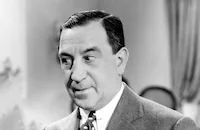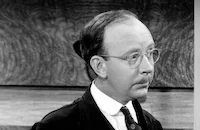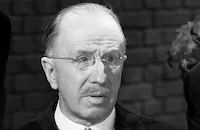Kansas City Princess

Brief Synopsis
Cast & Crew
William Keighley
Joan Blondell
Glenda Farrell
Robert Armstrong
Hugh Herbert
Osgood Perkins
Film Details
Technical Specs

Synopsis
Kansas City manicurist Rosie Sturgis is loved by Dynamite Carson, a small-time gangster. Marie Callahan, her fellow manicurist and roommate, urges Rosie to drop Dynamite and go after the three things a girl needs: "money, jack and dough." While Dynamite is in St. Louis, Rosie goes out with a rich customer, who happens to be Jimmy the Duke, a gangster on the lam, and he steals the diamond engagement ring Dynamite gave her. Fearing Dynamite's anger, Rosie and Marie head for New York and disguise themselves as Outdoor Girls of America to blend in with a troop traveling by train. In a New York taxi, Rosie and Marie meet two businessmen, Samuel Warren and Jim Cameron, and follow them on board a ship bound for Paris. Rosie and Marie finagle the men into paying for their passage and buying them new clothes. Dynamite, who has followed the women, hides in the stateroom of millionaire Junior Ashcraft, who has hired detective Marcel Duryea to investigate his actress wife, "Love-ums," who is having an affair in Paris with Russian Dr. Sascha Pilnakoff. When Rosie and Marie learn that a millionaire is on board, they pose as French manicurists and enter his room. Although Dynamite exposes them, they fall into hysterics, and Junior gives them a check to repay Cameron and Warren. In Paris, Duryea reports to Junior, and Rosie agrees to pose as Pilnakoff's lover to make Love-ums jealous. Duryea, who is allied with Love-ums to get a large divorce settlement, double-crosses Junior, however, and instead of his wife finding Pilnakoff with Rosie, she finds Junior with Marie. Junior decides to give up his wife in favor of Marie, and Rosie promises to return to Kansas City with Dynamite on the condition he go "straight."

Director

William Keighley
Cast

Joan Blondell

Glenda Farrell

Robert Armstrong

Hugh Herbert

Osgood Perkins
T. Roy Barnes

Hobart Cavanaugh
Gordon Westcott

Vince Barnett
Ivan Lebedeff
Renee Whitney

Arthur Hoyt
Crew

Film Details
Technical Specs

Articles
Kansas City Princess
Glenda Farrell and Joan Blondell play the two manicurists, the go-to profession for working class girls of early 30s comedies (at least those who weren't either showgirls or the euphemistic "dance hall" workers). Blondell and Farrell were teamed in four other pictures: Havana Widows (1933); Miss Pacific Fleet (1935); We're in the Money (1935), named for the ubiquitous number from the studio's huge hit Gold Diggers of 1933 (1933), which featured Blondell; and a late entry in that series, Gold Diggers of 1937 (1936). They both appeared in the same movie a few other times, including Three on a Match (1932), I've Got Your Number (1934), and Traveling Saleslady (1935), although not as a team in any of these.
Farrell is particularly adept at the script's rapid-fire dialogue, with her alleged 390-words-per-minute skills serving her well here. While Blondell was born in New York and raised in vaudeville, Farrell's ability to pull off the hard-boiled urban blonde is the more remarkable considering her Oklahoma roots. She matches Blondell quip for quip, brass for brass, and their appeal together made for some decent hits for the studio.
Blondell's gangster boyfriend is played by Robert Armstrong. Viewers will recognize him as big-time promoter Carl Denham, the man who brings King Kong to New York in the 1933 original of that story.
William Keighley was one of Warner's most reliable contract directors of the 1930s, turning out pictures with Queen of the Lot Bette Davis and top star James Cagney (five films total), although not necessarily the best of their careers. His work behind the camera with swashbuckler Errol Flynn on The Prince and the Pauper (1937) earned him the plum assignment of directing the star in The Adventures of Robin Hood (1938)-a role originally intended for Cagney. Less than stellar rushes of the picture's action scenes, however, got Keighley replaced by Michael Curtiz, although Keighley still retains on-screen credit.
Kansas City Princess includes several songs, but only one of them stood the test of time to become an enduring standard, Johnny Green and Edward Heyman's "Easy Come, Easy Go." The song became so emblematic of the Depression era that it was used as the evocative theme of the 1930s-set drama They Shoot Horses, Don't They? (1969), starring Jane Fonda as a hard-boiled, down-on-her-luck woman whose last bid to make some money lands her in a grueling marathon dance contest.
The working title of the movie was "Princess of Kansas City." It was ready for release in early July 1934, but because Blondell was pregnant (with future TV producer Norman S. Powell), the studio held it back until October so that she wouldn't be off screen for too long. The cinematographer on this production was George Barnes, then Blondell's husband and father of her child (who changed his name to Powell when he was adopted by Blondell's second husband, Warner singing star Dick Powell). Barnes later worked with Alfred Hitchcock on his first Hollywood movie, Rebecca (1940), for which Barnes won an Academy Award. He was nominated again for Hitchcock's Spellbound (1945) and six other times.
Director: William Keighley
Screenplay: Sy Bartlett, Manuel Seff
Cinematography: George Barnes
Editing: William Clemens
Art Direction: John Hughes
Cast: Joan Blondell (Rosie Sturges), Glenda Farrell (Marie Callahan), Robert Armstrong (Dynamite Carson), Hugh Herbert (Junior Ashcraft), Osgood Perkins (Marcel Duryea), Hobart Cavanaugh (Alderman Sam Warren).
BW-64m.
By Rob Nixon

Kansas City Princess
Quotes
Now get this and get it straight. A girl's got to have three things nowadays: money, jack, and dough! 'Bout time you learned it.- Marie Callahan
Trivia
Notes
Prior to release, the film was entitled Princess of Kansas City. According to Daily Variety, the film was completed three months before its release, but the studio decided to delay release until after the birth of Joan Blondell's child so that she would not be off the screen for too long a period.
















